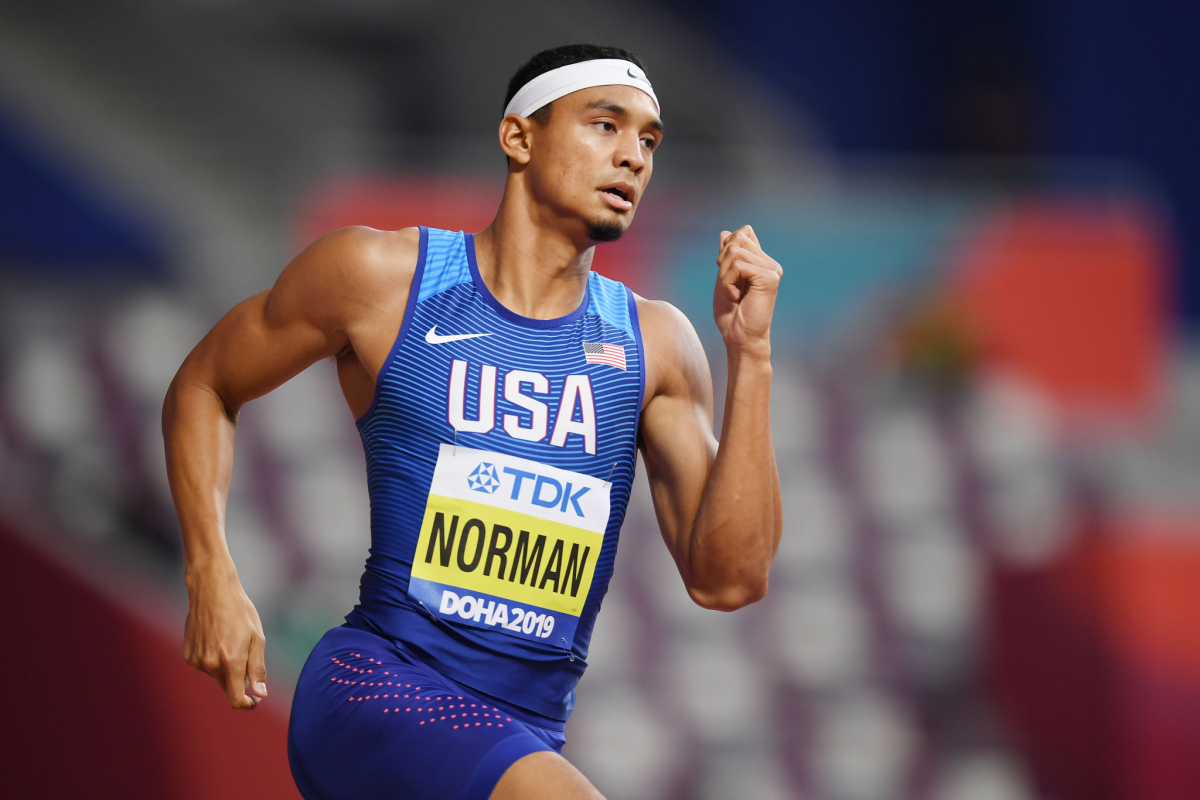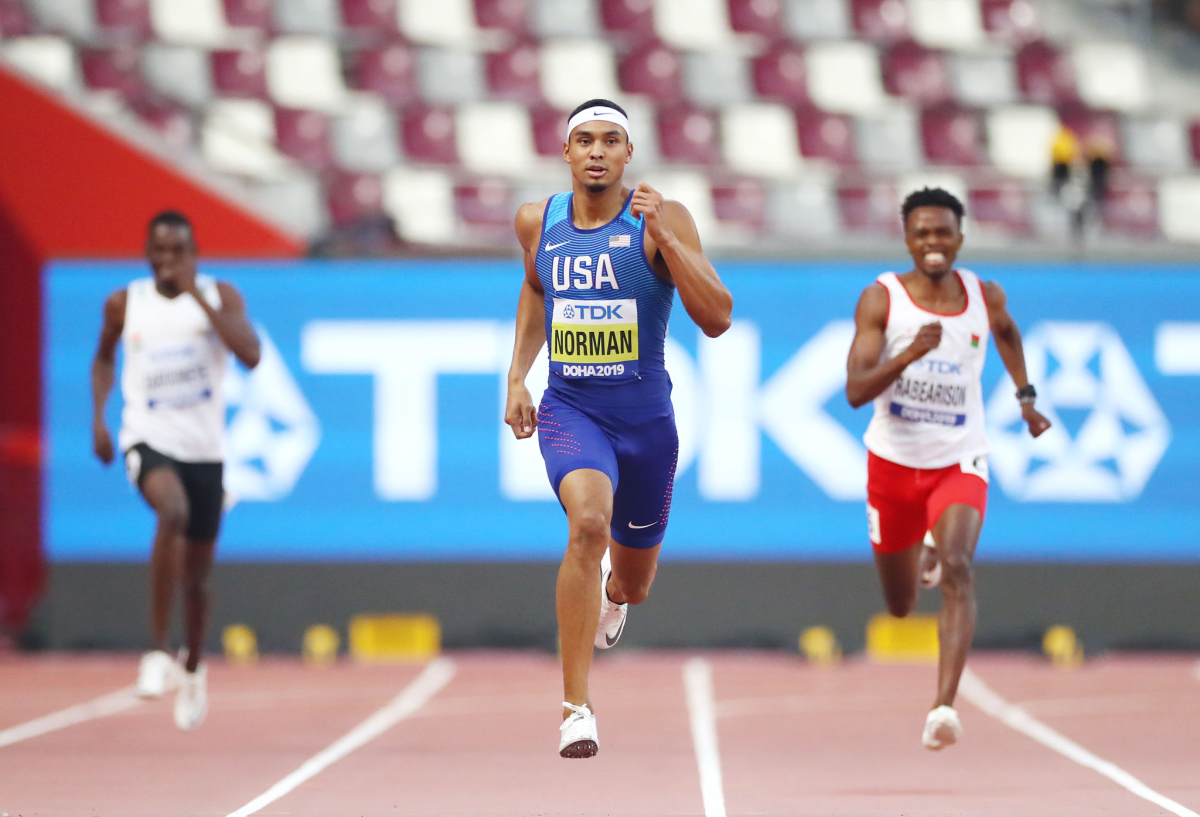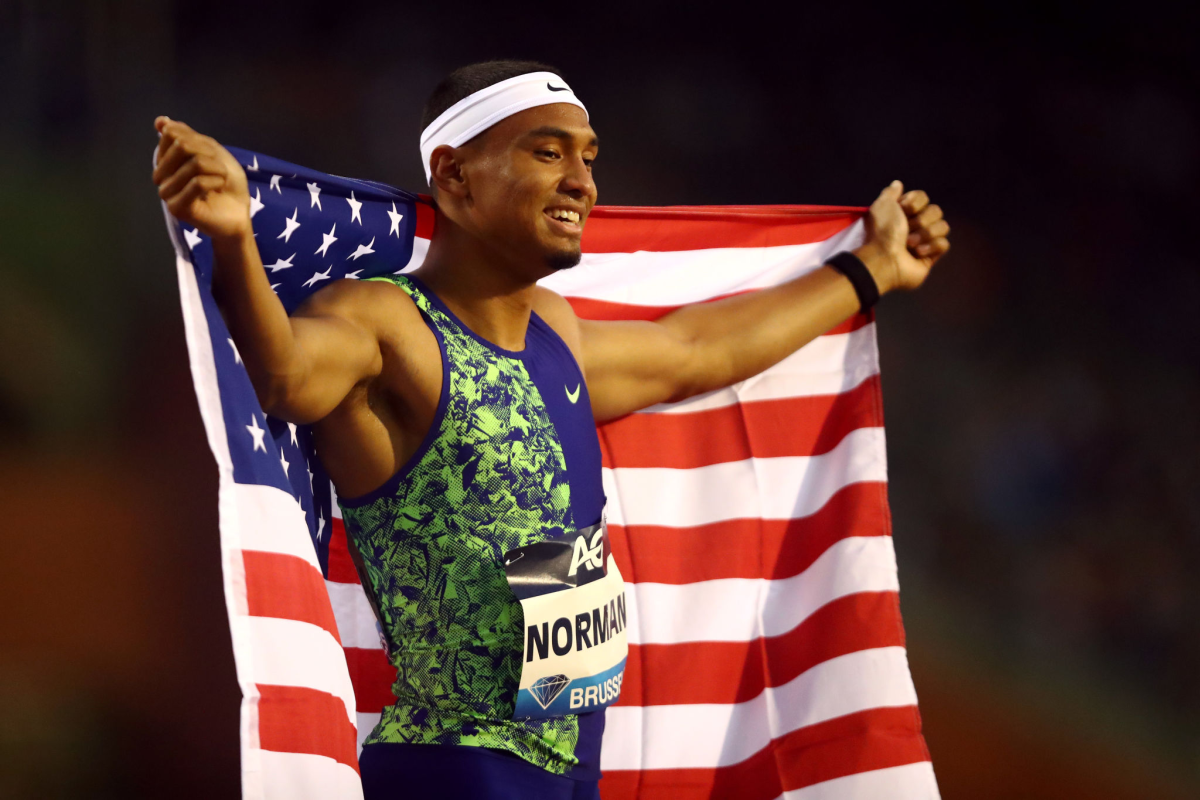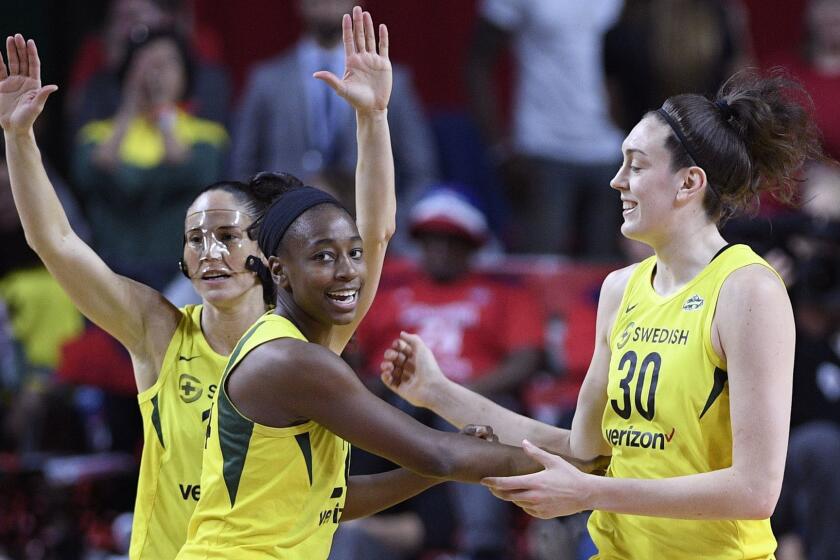Column: Michael Norman isn’t letting the coronavirus outbreak slow his Olympic ambitions

- Share via
Before the coronavirus outbreak postponed the Olympics, this was supposed to be the opening week of the Tokyo Games, a realization that has surely prompted would-be competitors to ask themselves: What if … ?
The voice inside of Michael Norman’s head is especially loud.
A state champion at Vista Murrieta High and national champion at USC, Norman is to track and field what Zion Williamson is to basketball or what Lamar Jackson is to football. Still only 22, he posted the world’s fastest 400-meter time in each of the last two years.
Which is why what he did Monday sent shockwaves throughout his sport.
At a small meet in Texas, Norman won a 100-meter race in a wind-legal 9.86 seconds.
That’s more than fast. That’s the fastest time in the world this year. That’s Carl Lewis fast, literally, the mark equaling the personal best of the transcendent sprinter and jumper who won two Olympic gold medals in the event.
No quarter-miler has ever displayed that kind of high-end speed. The reigning Olympic champion in the 400, Wayde van Niekerk of South Africa, has a personal best of 9.94 in the 100. Michael Johnson, who held the 400-meter world record until it was broken by Van Niekerk, never broke 10 seconds.

Michael Norman’s 100-meter run in Texas.
Norman joined Van Niekerk as the only athletes to run under 10 seconds in the 100, 20 seconds in the 200 and 44 seconds in the 400.
Under the Olympic spotlight, with Van Niekerk pushing him, could Norman this summer have become the first to break 43 seconds in his signature event?
Norman acknowledged the thought crossed his mind, but said he is trying to maintain a positive outlook.
“I don’t think it’s a lost opportunity,” he said. “I can’t speak for everybody, but I would assume everybody feels very similar in the sense that they take this opportunity as [a] time to be even more prepared and ready for the Olympics the following year.”
What made the performance all the more astounding are the conditions under which Norman has had to train in recent months.
Norman turned professional after his sophomore season in college but continues to train under USC’s coaches. When the university shut down because of the pandemic, its track and weight room did too.
“We might have done [starting] blocks twice in five months,” USC coach Caryl Smith Gilbert said.
Norman’s training group, which includes roommate and 400-meter hurdler Rai Benjamin, former USC star and viral sensation Kendall Ellis and preps-to-pros phenom Candace Hill, became nomadic. The task of finding training sites became the responsibility of Trojans assistant coach Quincy Watts, who won a gold medal in the 400 at the 1992 Olympics. Not anywhere would do, as uneven surfaces could be hazardous for sprinters running at speeds approaching 30 mph. Watts likened the athletes to Ferraris that perform best on Germany’s well-maintained autobahn highway system.

“I had to look all over L.A. County and find autobahns,” Watts said.
The athletes trained on soccer fields. They ran repeats on a dirt path that borders the golf course at Griffith Park. They worked out on a residential street in Culver City, avoiding mail trucks and making small talk with curious residents between sets.
“It was an interesting experience,” Norman said. “Definitely one for the books.”
As memorable as the workouts were, Norman had trouble dealing with the uncertainty.
“It’s like, we’re still training for the Olympics, but is it going to happen?” Norman said. “What about Olympic trials? How are we going to race? What are we going to do?”
He received some answers in late March while running hill repeats on a trail behind UCLA’s Drake Stadium. Former Olympian Joanna Hayes, who coaches a team of athletes that occasionally works out with Norman’s, received a notification on her phone. The Olympics were postponed.
“I do remember it was like a breath of relief,” Norman said.
Norman is a self-described perfectionist and this wasn’t how he envisioned preparing for his first Olympics. At the same time, he was crushed.
“It was devastating for him,” Watts said. “I could see it right away.”
Watts was sensitive to what the athletes were experiencing. He knew what it was like for plans to change and for dreams to vanish.
“I cringe because Olympics aren’t guaranteed,” he said.
Watts was 22 when he won two gold medals in Barcelona. He figured he would return to the Olympics, only to injure his back in a car accident three years later. He never competed in the Games again.
Norman tried to remain upbeat.
“Everything happens for a reason,” he said.

Norman pointed to his recent 100-meter race. He last ran the event as a high school senior in 2016, when he registered a 10.27 racing into a headwind.
While Norman was focused on the 400, he pleaded with Smith Gilbert and Watts to let him run a 100. He was rebuffed each time.
Ironically, when Norman was being recruited in high school, Smith Gilbert was one of two college coaches who told him his best event was the 100. The other was Lewis, now an assistant coach at the University of Houston.
The pandemic offered an opportunity. With travel restrictions limiting, if not eliminating, the chances of Americans competing in Europe this year, the meet was staged in Texas primarily to help athletes honor the terms of their shoe contracts. There was no reason for Smith Gilbert and Watts to keep Norman from running a 100; he wasn’t scheduled to run an important race again until the Olympic trials next year. If anything, Smith Gilbert thought Norman could make a case to be included on the U.S. 400-meter relay team.
With Benjamin two lanes to his left, Norman moved into a tie for 17th on the all-time 100-meter list with the likes of Lewis, Frankie Fredericks and Ato Boldon.
“Now, he’s created another problem for us,” Watts said with a hearty laugh.
Norman’s agent, Emanuel Hudson, raised the possibility of Norman attempting a 100-400 double in Tokyo next year. Only one athlete has won both races at the same Games: Thomas Burke in 1896 at the first modern Olympics.
Asked if he’s considered the possibility, Norman replied, “Honestly, no.”
Smith Gilbert said the 100 could very well be in Norman’s future — but after the Olympics.
Norman could also attempt the 200-400 double that Johnson completed at the 1996 Games in Atlanta. In addition to his world-leading time of 43.45 in the 400 last year, Norman also recorded the second-fastest 200 at 19.70. But his experience at the world championships last year gives him pause. Nursing a hamstring injury and worn down by competing on the professional circuit for the first time, Norman failed to reach the final in the 400.
The WNBA season begins Saturday with former champion and title favorite Seattle taking on New York and No. 1 draft pick Sabrina Ionescu.
Winning the 400 will be hard enough. Van Niekerk has run 43.03 and will be 29 next year.
“Do I run two events or do I just focus on one event just because I wasn’t able to get a medal in Doha?” Norman asked.
Norman is part of what could be a golden generation of American track and field athletes. His contemporaries include Noah Lyles, 23, the world champion at 200; 400 hurdler Sydney McLaughlin, 20, who ran at the Rio Olympics as a teenager; and high jumper Vashti Cunningham, 22, a former world indoor champion and daughter of former NFL quarterback Randall Cunningham.
One or more of them was expected to emerge as a household name this summer. Norman could be particularly marketable at the Tokyo Games because of his background. His mother, Nobue, once set a Japanese middle school record in the 100. Norman, who earned a degree in communications from USC last year, is preparing for possible opportunities by taking Japanese lessons.
Norman acknowledged he has considered the possibility that the Olympics might not be staged next year, either.
“Of course, that’s in the back, back, back of my mind,” Norman said. “But I always want to keep positive thoughts, positive vibes, so I try not to really think about that.”
He believes his time will come.
More to Read
Go beyond the scoreboard
Get the latest on L.A.'s teams in the daily Sports Report newsletter.
You may occasionally receive promotional content from the Los Angeles Times.








